In an increasingly interconnected world, the Bahá’í teachings offer profound insights into the celebration of diversity as an antidote to the scourge of prejudice. The Bahá’í perspective emphasizes that the differences among individuals—whether based on race, ethnicity, religion, or culture—should not only be acknowledged but revered as enriching attributes that contribute to the collective tapestry of humanity.
At the heart of Bahá’í teachings lies the concept of the oneness of humanity. This doctrinal principle posits that all individuals, regardless of their origins, are equal in the eyes of God. Such a profound assertion encourages an exploration into the foundational beliefs that render diversity a source of strength rather than division. The need to dissolve artificial barriers that segregate individuals and promote a homogenous worldview is not merely a philosophical exercise but rather a moral imperative encapsulated in the Bahá’í perspective.
In examining the reasons behind prejudice, one recognizes that it often arises from ignorance and fear. The manifestations of prejudice are not incidental but systemic, addressing intricacies ingrained within societal fabric. The Bahá’í teachings articulate that to extinguish the flickering flames of prejudice, it is essential to nurture understanding through education and dialogue. This commitment to fostering knowledge emerges from the recognition that ignorance is the fertile ground from which prejudice blossoms.
Dialogue provides a conduit for individuals to engage with the rich narratives that each culture offers. The Bahá’í principle of consultation, which encourages collaborative problem-solving among diverse groups, serves as both a practical tool and a spiritual mandate. Through genuine consultation, individuals can transcend superficial differences, cultivating a sense of belonging that embraces the plurality of existence. This active engagement inherently promotes empathy, allowing individuals to internalize the experiences and challenges faced by their peers.
Furthermore, the Bahá’í Faith underscores the significance of exemplifying tolerance. Tolerance, as practiced within this faith, is not merely passive acceptance but an active appreciation of others. Engaging with diverse perspectives can engender not only respect but also a genuine curiosity about the rich narratives that inform different ways of living. This empathetic approach aids in dismantling the barriers that perpetuate misunderstanding and hostility.
Rooted in the teachings of Bahá’u’lláh, the founder of the Bahá’í Faith, is the conviction that all religions stem from the same divine source. This view transcends mere theological discourse, positioning religious diversity as a celebration of the various manifestations of God’s guidance to humanity. Each faith tradition offers vital wisdom that, when integrated, enhances the overall understanding of spiritual truths. In this context, prejudice becomes not only an affront to dignity but also a disservice to the collective wisdom that various religious groups can impart to one another.
Moreover, the celebration of diversity is closely intertwined with the contemporary movement towards gender equality. Bahá’í teachings unequivocally advocate for the equal participation of women and men in all spheres of life. This emphasis on gender parity illustrates that diverse perspectives are not only welcome but essential for the advancement of society. The mutual empowerment of individuals across gender lines enhances decision-making processes, leading to more holistic and just solutions to social challenges.
Social and economic disparities further complicate the landscape of prejudice. The Bahá’í approach advocates for the alleviation of material poverty as a means to diminish the socioeconomic factors that perpetuate prejudice. By promoting equitable opportunities for all, the Bahá’í community works towards bridging gaps that foster division. Economic empowerment is a multifaceted endeavor encompassing education, vocational training, and community development initiatives, each enhancing the potential for unity amidst the diversity of experiences.
Art and culture serve as powerful tools for expressing and celebrating diversity. Artistic expression transcends linguistic and cultural boundaries, enabling individuals to connect on a visceral level. The Bahá’í teachings encourage the cultivation of the arts as a means to reflect the beauty of humanity’s diversity. By showcasing the rich array of cultural narratives through various forms of artistry, communities not only celebrate their heritage but also contribute to a collective narrative that honors the uniqueness of every individual.
In conclusion, the Bahá’í teachings present a robust framework for celebrating diversity and combating prejudice through various mechanisms. Recognizing the oneness of humanity is not merely a lofty ideal; it is a call to action. The promotion of education, the practice of consultation, the cultivation of tolerance, and the engagement with spiritual equality across genders are foundational to fostering an inclusive society. Additionally, addressing socioeconomic disparities and embracing the arts serve to further elevate the collective consciousness. As individuals and communities embrace these principles, the flames of prejudice will be extinguished, paving the way for a harmonious existence where diversity is not only acknowledged but celebrated as a fundamental aspect of the human experience.
